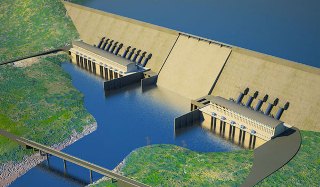Tripartite meeting on Nile water agrees to conduct impact studies on Ethiopian dam
August 26, 2014 (KHARTOUM) – The water and irrigation ministers of Egypt, Ethiopia, and Sudan meeting in Khartoum sealed an agreement by which a committee comprised of experts from the three countries would be formed under the supervision of an international consultancy firm to conduct studies on the impact of the Grand Renaissance dam.

The proposed committee would bring four experts from each country and would finish its work in six months time starting from the 1st of September.
In the last three meetings held in Khartoum, Ethiopia vehemently rejected Egypt’s idea to form new committees to study the dam’s impact.
Egypt’s Irrigation Minister Hussam El-Maghazi told reporters that this is an agreement on the mechanism for implementing the recommendations of the IPoE which is important to Cairo he said to ascertain that its share of water is not affected and also to verify the integrity of the dam structures.
“We didn’t say that Egypt publicly agreed to the construction of the dam…the final word on that is with the international consultancy firm….we have not agreed to the storage capacity of the dam,” El-Maghazi said.
The Egyptian minister said at the opening of the negotiations that “we have a special status different from the rest of the states, as we are entirely dependent on water from the Nile”.
For his part, the Ethiopian minister of Water Resources and Electricity Alemayehu Tegen said the agreement enhances confidence between the three countries but stressed that work in the dam will not stop.
“There is no reason to stop the construction of the dam and we understand the concerns of the Sudanese and Egyptians on the dam,” Tegen said.
He extended an invitation to his counterparts in Egypt and Sudan to visit the site of the dam in the near future.
Egypt argues the multi-billion dollars project, which Ethiopia is building along the Nile River near the Sudanese border, would eventually diminish its water share. It further asserts that the dam, which is the largest along the Nile river would reduce the amount of electricity generated by the Aswan Dam and adversely impact its agricultural production.
The IPoE in their final report said Ethiopia’s dam project would not result in any significant harm to the two downstream countries, Sudan and Egypt.
(ST)
